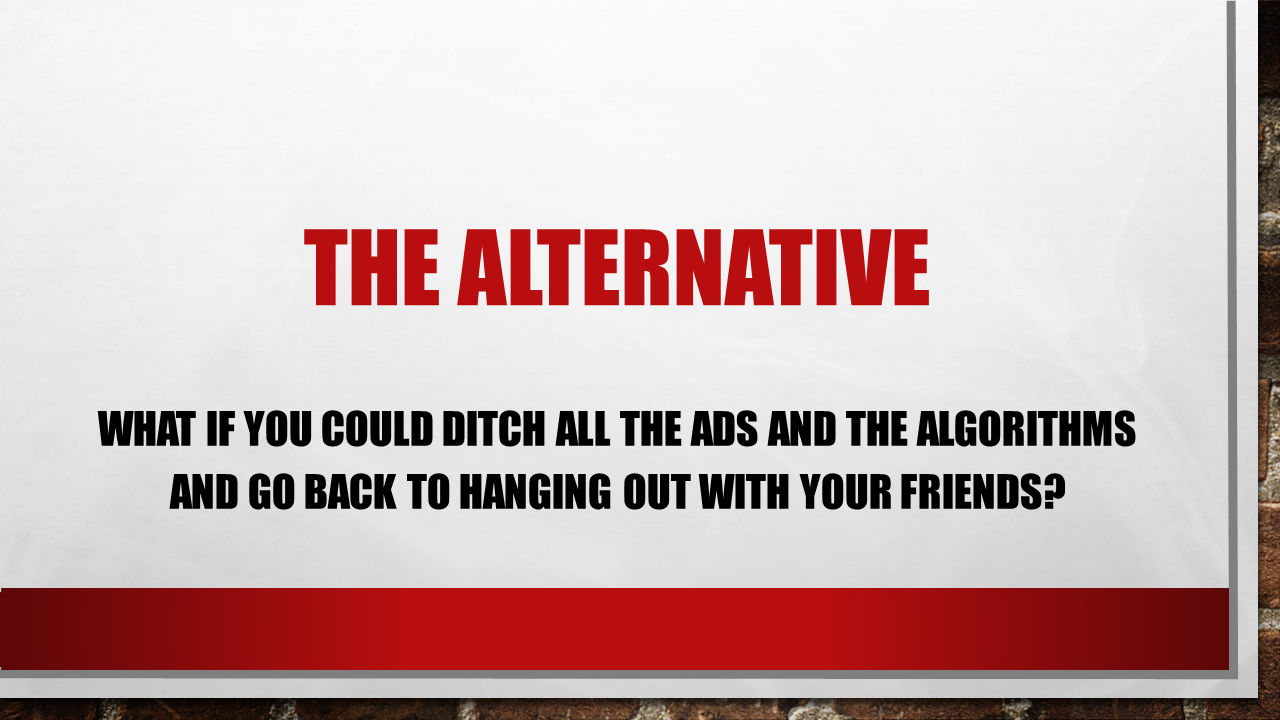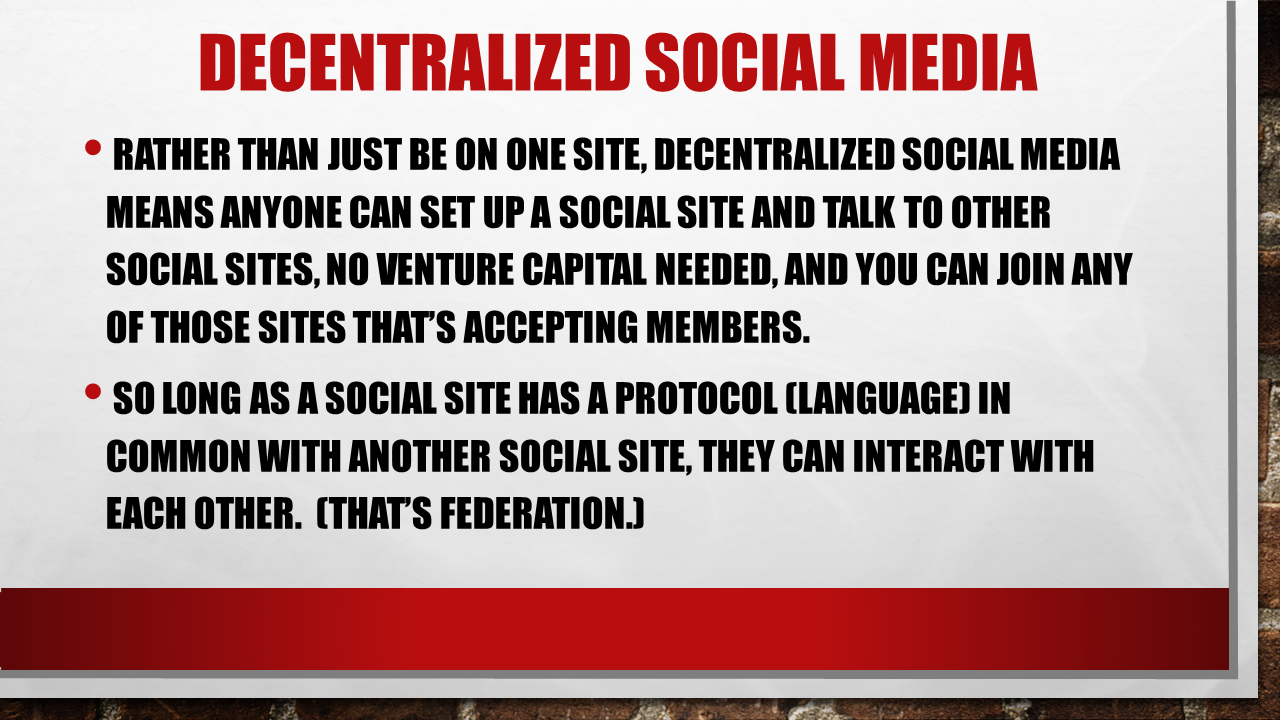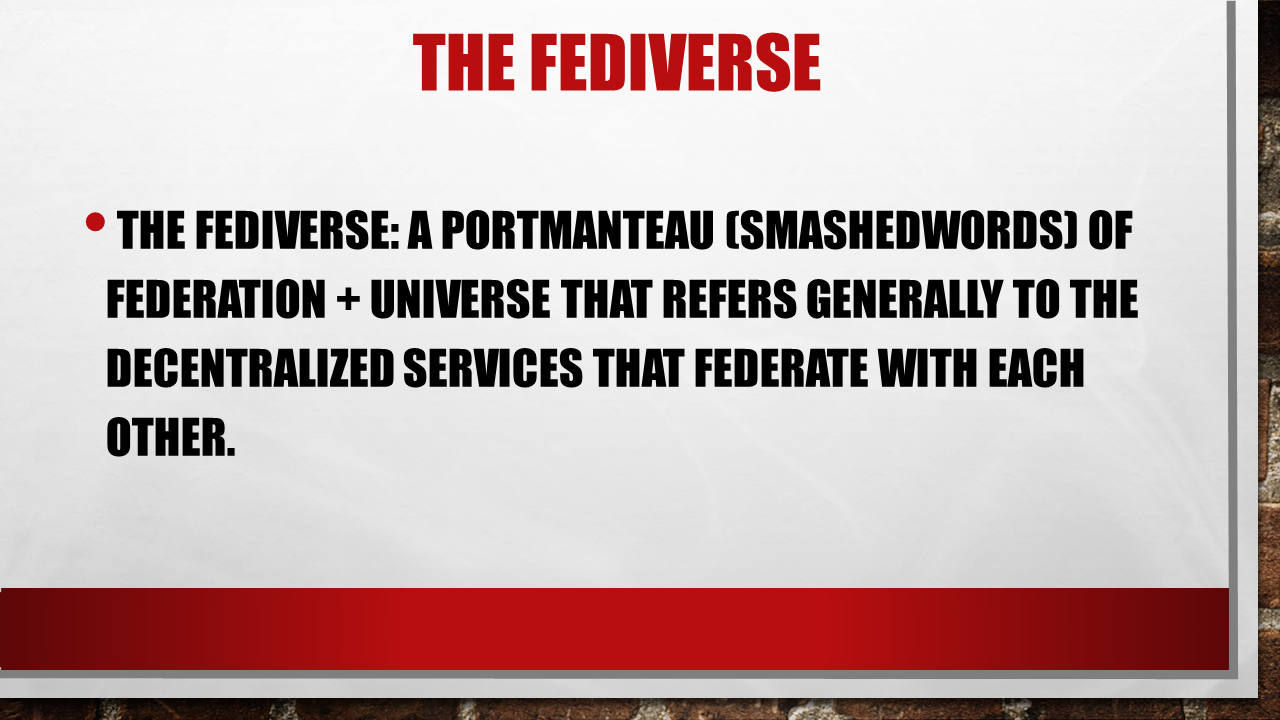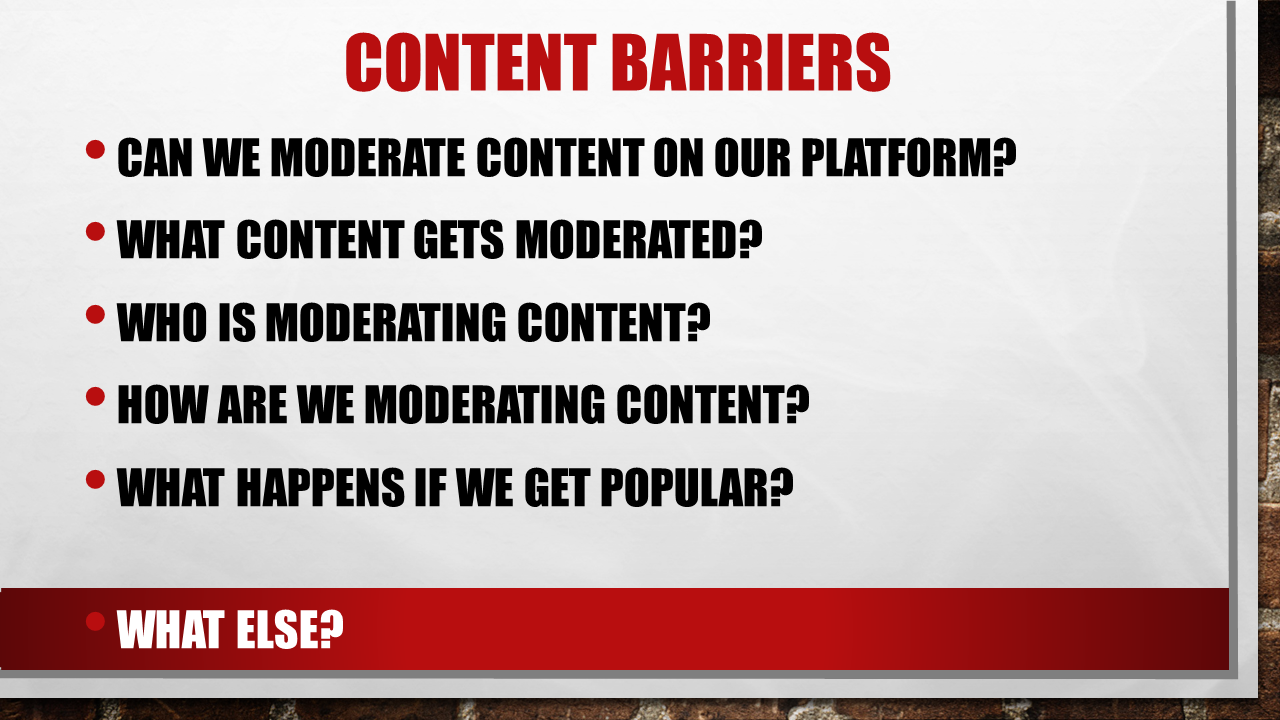

There exists alternatives to the way that current social media works. In addition to smaller sites that aren't algorithm/engagement/advertisers focused, the biggest challenger to current corporate social media sites are a set of decentralized social media sites and programs. Rather than one site that everyone comes to, decentralization allows anyone who is interested and has the necessary infrastructure to stand up a social media site of their own. Decentralization then goes hand in hand with federation, the use of a common protocol (language) to communicate with other social media sites. So long as two sites are speaking the same language (using the same protocol), they can communicate with each other so their users can follow each other and get each other's updates across sites. The aggregation of decentralizeed, federated sites across the Internet makes up the Fediverse (the Federated Universe), often shortened to "fed" or "fedi" by those who use it.


Leaning into the idea of the public library as a democratizing force who has historically aligned themselves in favor of privacy and trying to reduce the amount of corporate control over information (and generally promoting themselves as in favor of "freedom" even in situations where that would mean allowing and promoting materials that are offensive and anti-social), I have a "small, simple" proposal for libraries.
Your library (or library system) should host at least one instance / node of a Fediverse server/service.

By thinking a little bit about such a proposal, it becomes obvious that while it can be summed up in a single sentence, there's a lot more complexity and things to unpack than there appears at first blush. Some of the benefits to the proposal that I can think of immediately include:
- Decentralized social media puts control back in the hands of people to make decisions about who they want to follow, what content they want to see, and how much they want to engage with their social media, subject to the decisions that get made by the administrators of their social media node.
- Decentralized social media encourages the use of methods other than ads and data collection to pay the bills, so people using those services won't see "promoted posts" or other ads cluttering up their timeline, for the most part. A library-run instance, funded by library dollars, wouldn't need to run ads to handle server costs, so all of the interactions on the server would be people-to-people interactions.
- Decentralized social media, at least for text-based instances like Mastodon, Pleroma, MissKey, and Bookwyrm will have relatively modest requirements for hardware and relatively modest costs for bandwidth and that hardware. (Popularity, of course, could explosde those costs, but they're likely to be smaller than setting up something that's going to be about images and video, like PixelFed or PeerTube.) Libraries with limited budgets can still potentially stand up a small server for their community with small initial starting costs in the objects, and then advertise their service as a local alternative to the big things.

That said, there are a lot of potential challenges that come with those benefits, both in the technical administration of the service and in the demands for staff time that running a social interaction space will produce. Because people.
- Libraries and library systems that are very under-resourced may not have an IT person, much less an IT department, to handle when technical problems come up that need fixing, or even to handle the routine maintenance part of updating and ensuring their instances are patched against security vulnerabilities. Having an enthusiastic volunteer might help, but they're not necessarily going to want to maintain that system for years and decades on end (unless they're really committed to the bit, and people who are often are running their own social, instead of yours.)
- Even if there is an IT department or person in a library system, they may be far too busy working on putting out fires in library-critical systems or keeping the entire operation running on duct tape and string to even consider adding something new to their responsibilities. And even if a staff person promises to handle the aspects of running updates and moderating, the response to a suggestion might still be no, because the library system itself doesn't have the capacity to take on new work.
- One of the big barriers to doing things on-line is that most tools, including decentralized social media, are meant to be run in a Linux/POSIX-compatible environment. For people who aren't IT folks, and who aren't experienced with running webservers and other Internet-connected servers, Linux means learning an entirely new operating system, new tools, new commands, and getting to know an entirely different community of people than they know as a user, and especially a user that's been in a Windows or MacOS (or Android/iOS) environment for the entirety of their computing experiences. There aren't a lot of user-friendly options for someone to learn how to deploy a public-facing server and keep it secured so that it only does the things that it's supposed to do and resist attacks and attackers. (And to keep domain names registered and Secure Socket Layer / Transport Layer Security certificates updated and correctly installed and configured, and, and, and…) YUNoHost is trying to make it easier to set up and deploy a personal hosting solution that can include decentralized social media operations and similar applications for small groups, but it's meant for people who are trustworthy rather than as a general distribution.
- Many of the services and technical aspects discussed above can be outsourced. There are hosting services for decentralized social media spaces that will handle the updating and the technical backends and the hosting parts, which just needs you to point your domain name at them, and so forth, but of course, that costs money to do, and in places that are already under-resourced, money is usually one of those very rare resources that gets highly scrutinized. If you can't make a case immediately that the program will be popular and well-used, there's not really a likelihood of funding coming from the library. (Grant funding may be possible, but it's not usually there for ongoing maintenance and operations of any given project.)

In addition to the potential technical barriers, running a social site means that there will need to be people time devoted to making sure that the people play nice with each other and that there aren't things that are patently illegal being shared or posted to the social media space. There's a strong likelihood that this part of running a social media site will take more time and effort than the technical aspects.
- The biggest decision that will have to be made, and possibly made up front, is what kind of moderation will be enforced on the social site. The tools that provide federated, decentralized social media instances don't usually make content decisions on their own, meaning that it's entirely possible for people who are of very different political persuasions to use the same tools to connect. It's possible for instance administrators to decide how much of any other instance they want to connect with, up to and including cutting off another instance entirely and prohibiting any content from that instance from appearing on their own instance, as well as preventing anyone from their instance from following someone on an interdicted instance. With these powerful tools at their disposal to shape the experience of their users, libraries will have to make philosophical decisions about how much and what kind of moderation they wish to engage in with their users. Some libraries will interpet their policies and decisions to mean that if they offer the service, there will be no moderation or content control (past, presumably, that which is illegal in their jurisdictions) in the name of intellectual freedom and anti-censorship. Other organizations may apply their acceptable use policies and/or Rules of Conduct policies to their online services and expect their social people to abide by those same rules of behavior online as well as in the library. If there are potentially minors being allowed to sign up for the service, additional rules might be put in place for them to be able to use the service. All of these decisions will need to be thought through, and policies and documents created, before embarking upon offering social media services to the public.
- Beyond what content gets moderated, how moderation happens and what steps are provided for moderation will need to be conceived, outlined, and posted so that all of the people who choose to use the service know what will be expected of them and how they can expect bad behavior to be moderated by the library staff (or their designated people.)
- And finally, the question of who is moderating becomes extremely important. Spreading the job of looking at potentially objectionable content among the staff is a good idea so as to not lock specific people into having to look at the worst of what people come up with on a daily basis. Rotating teams so that noboody stares into the abyss for too long is important to the mental health of everyone involved. Similarly, while moderation teams should be composed of people from as many different experiences as possible (so as to catch more baqd behavior that's more visible to people who are used to having that kind of behavior used against them,) people should be allowed to refuse to participate if it would be harmful for them to have to moderate. And, as with so many other things, if the kind of work being asked of someone is beyond what they would normally do in their classification, they should be paid appropriately to the classification of work they are doing. It's bad form to expect more of someone than what you're paying them for.
These are an example of the possible problem and benefit space. Using and providing social media services to people may surface new and different benefits and problems than the ones outlined here. Even with all of these possible drawbacks, I think it's worthwhile for public libraries to offer an instance, especially if those instances can then link up to each other, so that library patrons all over the country and the world can connect with each other through their libraries, in an ad-free environment without the pressures or the algorithms trying to drive more and more "engagement" with content they don't actually like. For people who want a social media space that's actually social, or for people who aren't going to leave their current corporate centralized social media space until they can be sure there are enough people out there, a network of library social media spaces might help boost numbers and give people the nudge to try something different than what they've always known.